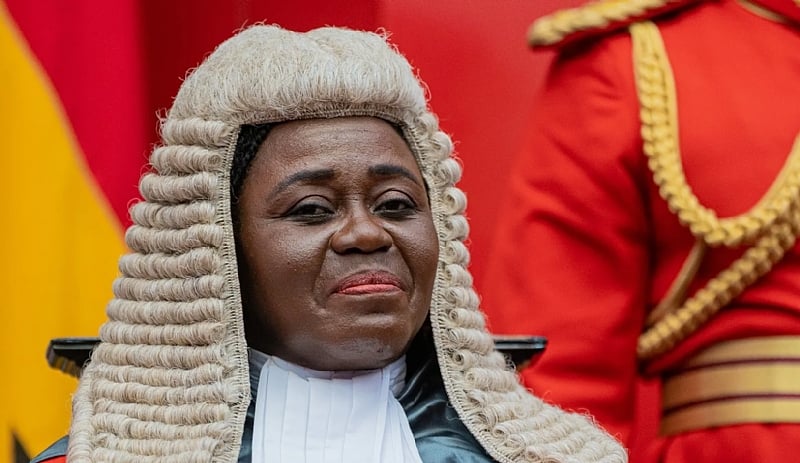The looming suspension and potential removal of Ghana’s Chief Justice, Gertrude Araba Esaaba Sackey Torkornoo, represent a critical juncture for the nation’s democratic institutions and its socio-political landscape. The Council of State’s confirmation of a prima facie case against the Chief Justice has set the stage for the formation of a tribunal, an unprecedented event in Ghana’s Fourth Republic. This development has sparked widespread speculation and debate, with analysts predicting a 70% chance of her removal based on historical precedents in similar cases involving constitutional officeholders. While the specific charges against the Chief Justice remain unclear, the potential ramifications of her removal are far-reaching and encompass concerns about judicial independence, political influence, and international investor confidence.
The situation is further complicated by the unusual silence from Ghana’s typically vocal civil society organizations. These groups, known for their staunch defense of judicial independence and accountability, have been conspicuously absent from the public discourse surrounding the Chief Justice’s predicament. This silence has been interpreted by some as tacit approval of the proceedings, or at least a lack of opposition, suggesting a possible shift in the relationship between civil society and the judiciary. This silence stands in stark contrast to their usual reactions to matters of judicial independence and raises questions about the motivations and underlying dynamics driving their current stance. Some speculate that their silence may be influenced by the government’s narrative linking the Chief Justice’s case to its broader anti-corruption strategy, putting these organizations in a difficult position.
The government’s anti-corruption initiative, codenamed ORAL, has reportedly garnered significant support from influential civil society actors. This backing creates a complex dilemma for these organizations, caught between upholding judicial independence and supporting a process they perceive as crucial for judicial reform. The convergence of the Chief Justice’s case with the government’s anti-corruption agenda adds another layer of complexity to an already sensitive situation. It raises questions about the potential politicization of the judiciary and the extent to which the government’s narrative might be influencing public perception and the actions of key stakeholders like civil society organizations.
Furthermore, the potential removal of the Chief Justice comes against a backdrop of growing public discontent with certain judicial rulings. Both the current Chief Justice and her predecessor have faced criticism for decisions perceived as detached from public sentiment. The most prominent example is the controversial ruling declaring birth certificates insufficient proof of citizenship, a decision that sparked widespread public outcry and raised concerns about access to fundamental civic rights. This context contributes to the delicate nature of the current situation, as it highlights pre-existing tensions between the judiciary and public opinion.
The potential ramifications of the Chief Justice’s removal are significant and multifaceted. From an international perspective, the removal of a sitting Chief Justice could be interpreted as an indication of increasing political interference in the judiciary, potentially undermining investor confidence and impacting Ghana’s reputation for institutional stability. Domestically, the process and its outcome will likely have a profound impact on public trust in the judiciary. If the removal is perceived as a legitimate effort to address concerns about judicial impartiality and accountability, it could potentially strengthen public confidence. However, if seen as a politically motivated act, it risks further eroding public trust and damaging the judiciary’s credibility.
Ultimately, the success or failure of this process hinges on how it is framed and perceived by the public and relevant institutions. If successfully presented as a genuine attempt to enhance judicial integrity and responsiveness to public concerns, it could mark a positive turning point in Ghana’s governance. Conversely, if perceived as an erosion of judicial independence and a politically driven maneuver, it could have severe repercussions for the country’s democratic credentials and overall stability. The coming weeks will be crucial in determining not only the fate of the Chief Justice but also the future trajectory of Ghana’s legal and political landscape. The nation stands at a crossroads, and the handling of this situation will have profound and lasting consequences.














